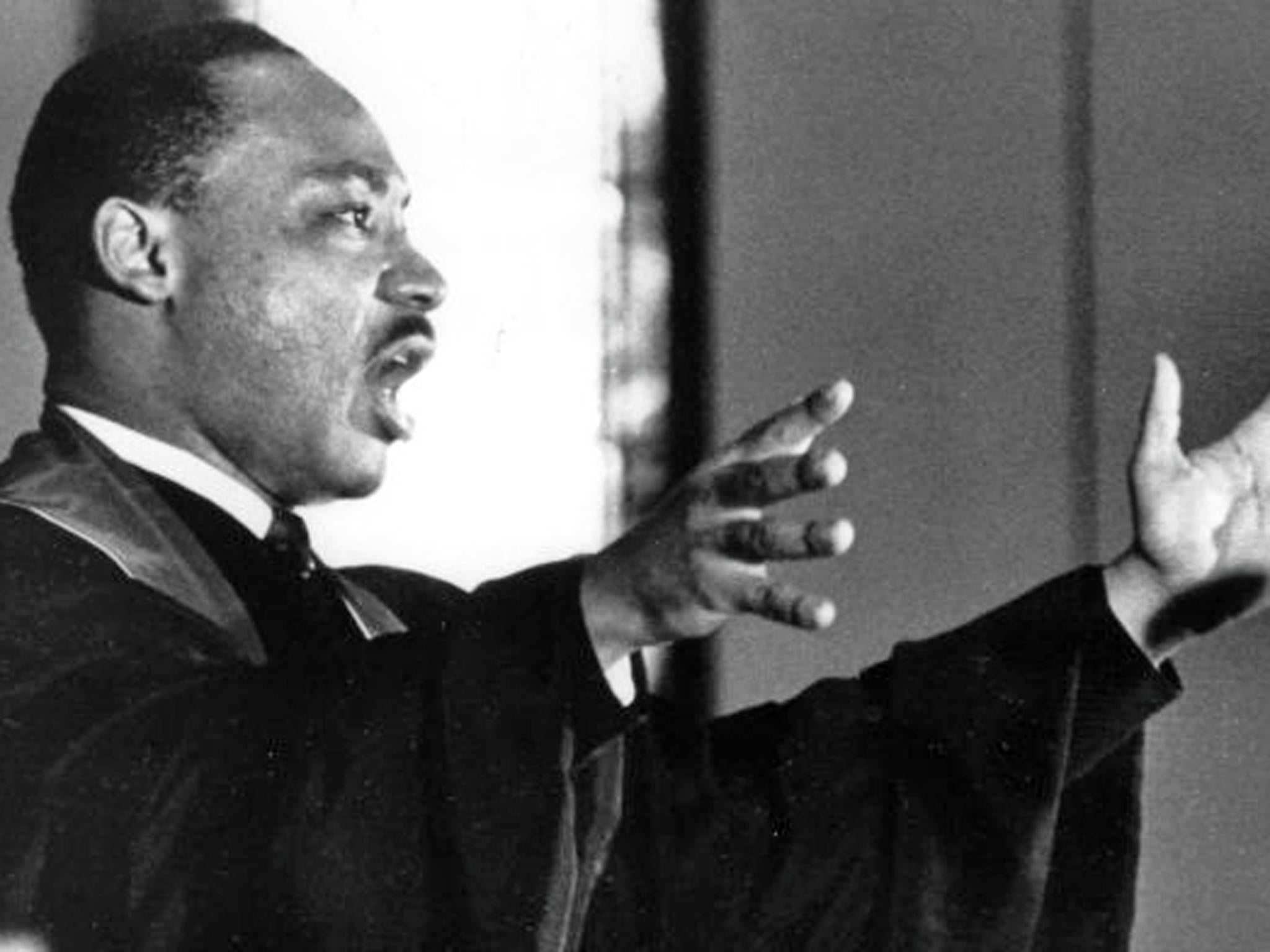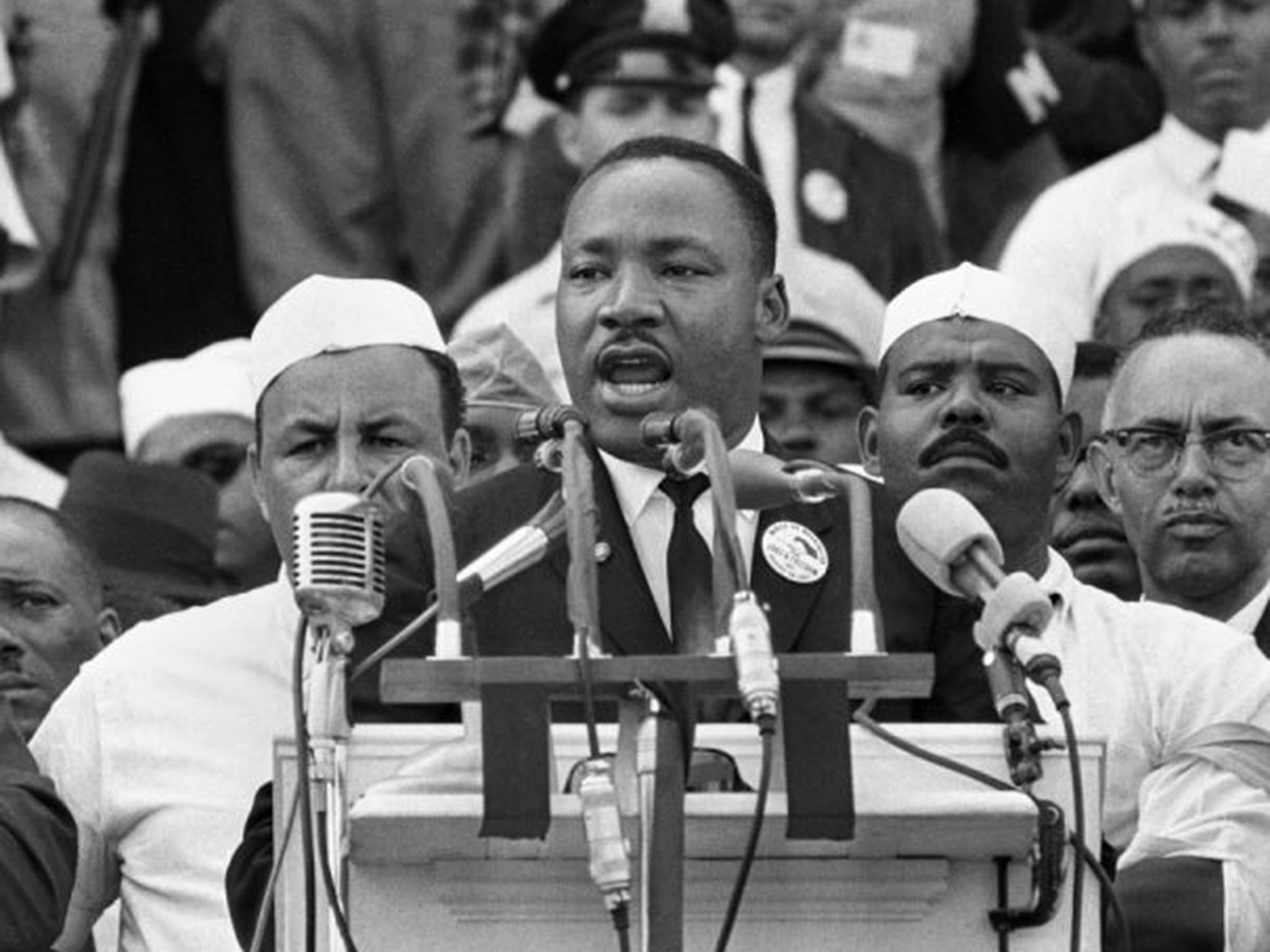Martin Luther King Jr. Day: The inspiring speeches you might not know
We all know the iconic "I have a dream" speech, but here are some less-famous quotes from the great orator that are every bit as inspiring

Your support helps us to tell the story
From reproductive rights to climate change to Big Tech, The Independent is on the ground when the story is developing. Whether it's investigating the financials of Elon Musk's pro-Trump PAC or producing our latest documentary, 'The A Word', which shines a light on the American women fighting for reproductive rights, we know how important it is to parse out the facts from the messaging.
At such a critical moment in US history, we need reporters on the ground. Your donation allows us to keep sending journalists to speak to both sides of the story.
The Independent is trusted by Americans across the entire political spectrum. And unlike many other quality news outlets, we choose not to lock Americans out of our reporting and analysis with paywalls. We believe quality journalism should be available to everyone, paid for by those who can afford it.
Your support makes all the difference.Martin Luther King's life and work are under the spotlight thanks to Selma, a new biopic about the civil rights leader that was controversially snubbed by the Academy Awards.
To celebrate his influence, here are extracts from some of his less-famous, but equally stirring speeches.
"When the opportunity presents itself for you to defeat your enemy, that is the time which you must not do it. There will come a time, in many instances, when the person who hates you most, the person who has misused you most, the person who has gossiped about you most, the person who has spread false rumors about you most, there will come a time when you will have an opportunity to defeat that person. It might be in terms of a recommendation for a job; it might be in terms of helping that person to make some move in life. That’s the time you must not do it.
"That is the meaning of love. In the final analysis, love is not this sentimental something that we talk about. It’s not merely an emotional something. Love is creative, understanding goodwill for all men. It is the refusal to defeat any individual. When you rise to the level of love, of its great beauty and power, you seek only to defeat evil systems. Individuals who happen to be caught up in that system, you love, but you seek to defeat the system."
Given at the funeral of children who died in the 16th Street Baptist Church Bombing, a turning point in the civil rights movement):
"These children - unoffending, innocent, and beautiful - were the victims of one of the most vicious and tragic crimes ever perpetrated against humanity.
"And yet they died nobly. They are the martyred heroines of a holy crusade for freedom and human dignity. And so this afternoon in a real sense they have something to say to each of us in their death. They have something to say to every minister of the gospel who has remained silent behind the safe security of stained-glass windows. They have something to say to every politician who has fed his constituents with the stale bread of hatred and the spoiled meat of racism. They have something to say to a federal government that has compromised with the undemocratic practices of southern Dixiecrats and the blatant hypocrisy of right-wing northern Republicans.
"They have something to say to every Negro who has passively accepted the evil system of segregation and who has stood on the sidelines in a mighty struggle for justice. They say to each of us, black and white alike, that we must substitute courage for caution. They say to us that we must be concerned not merely about who murdered them, but about the system, the way of life, the philosophy which produced the murderers. Their death says to us that we must work passionately and unrelentingly for the realization of the American dream."
"We must realize that we are grappling with the most weighty social problem of this nation, and in grappling with such a complex problem there is no place for misguided emotionalism. We must work passionately and unrelentingly for the goal of freedom, but we must be sure that our hands are clean in the struggle. We must never struggle with falsehood, hate, or malice. We must never become bitter.
"I know how we feel sometime. There is the danger that those of us who have been forced so long to stand amid the tragic midnight of oppression - those of us who have been trampled over, those of us who have been kicked about - there is the danger that we will become bitter. But if we will become bitter and indulge in hate campaigns, the old, the new order which is emerging will be nothing but a duplication of the old order. "

On the birth of a new nation (1957):
"Don’t go out this morning with any illusions. Don’t go back into your homes and around Montgomery thinking that the Montgomery City Commission and that all of the forces in the leadership of the South will eventually work out this thing for Negroes, it’s going to work out; it’s going to roll in on the wheels of inevitability. If we wait for it to work itself out, it will never be worked out. Freedom only comes through persistent revolt, through persistent agitation, through persistently rising up against the system of evil. The bus protest is just the beginning.
"Buses are integrated in Montgomery, but that is just the beginning. And don’t sit down and do nothing now because the buses are integrated, because, if you stop now, we will be in the dungeons of segregation and discrimination for another hundred years, and our children and our children’s children will suffer all of the bondage that we have lived under for years. It never comes voluntarily. We’ve got to keep on keeping on in order to gain freedom. It never comes like that. It would be fortunate if the people in power had sense enough to go on and give up, but they don’t do it like that. It is not done voluntarily, but it is done through the pressure that comes about from people who are oppressed."

On rediscovering old values (1954):
"I’m here to say to you this morning that some things are right and some things are wrong. Eternally so, absolutely so. It’s wrong to hate. It always has been wrong and it always will be wrong! It’s wrong in America, it’s wrong in Germany, it’s wrong in Russia, it’s wrong in China! It was wrong in 2,000 BC., and it’s wrong in 1954 AD. It always has been wrong, and it always will be wrong."
Join our commenting forum
Join thought-provoking conversations, follow other Independent readers and see their replies
Comments